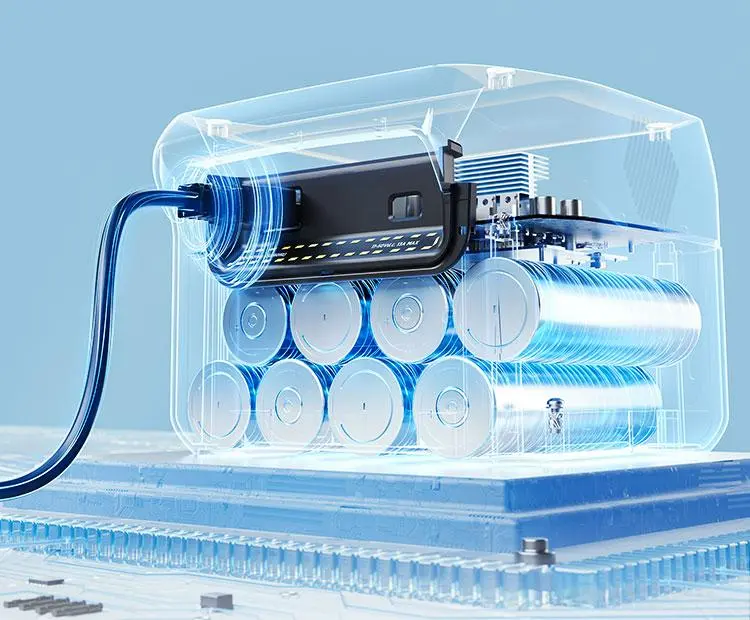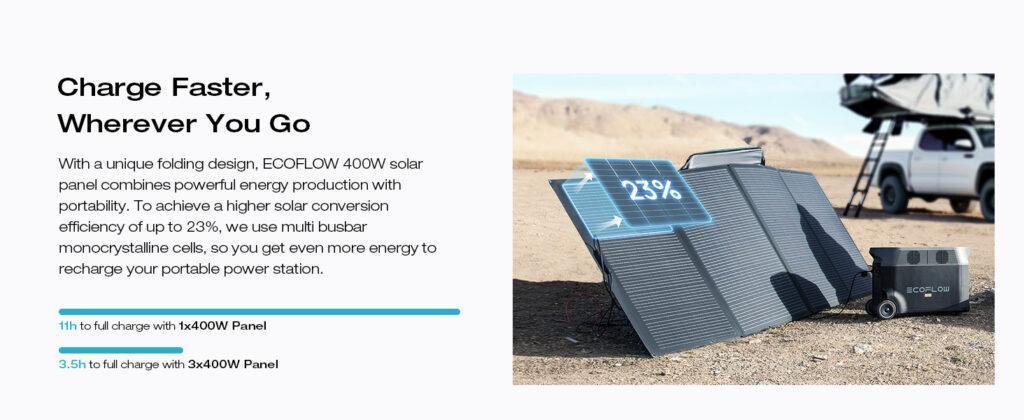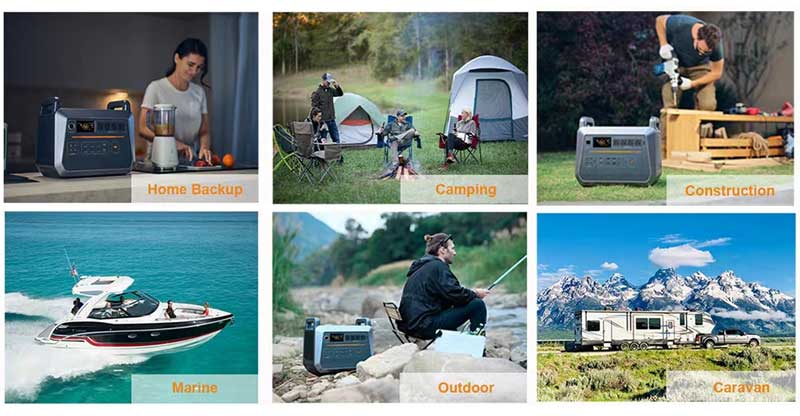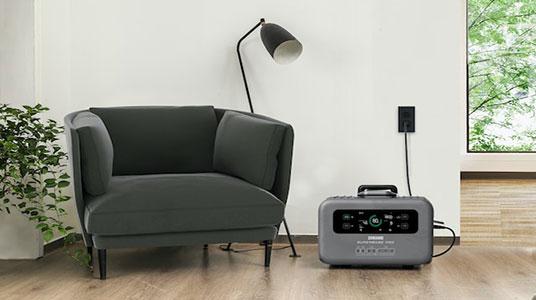What a portable power station
A portable power station is a device that provides electrical power in areas where grid electricity is not available or during power outages. It functions as a rechargeable battery pack that can store energy from various sources, including solar panels for home use, AC outlets, and car chargers. The portable power station stores energy, which can then charge electronic devices, run small appliances, and power lighting.
Importance of having a power source during home emergencies
A power outage can occur for a variety of reasons, such as severe weather, equipment failure, or system overload. During an outage, it can be difficult to perform basic tasks such as cooking, heating, and communication. Without power, medical equipment such as oxygen machines and ventilators may not work, putting individuals with health conditions at risk.
Having a reliable source of power during home emergencies is essential. It allows individuals to stay connected to the outside world, stay warm and cook food, and maintain medical equipment. A portable power station can provide a backup power source during an emergency, ensuring that essential devices and appliances remain operational.
The Benefits of Using a Portable Power Station for Home Emergencies
we will examine how a portable power station can provide a reliable source of power, its versatility in terms of use and portability, and its safety features. We will also discuss the different types of portable power stations available and the factors to consider when choosing one.
Benefits of using a portable power station for home emergencies
Reliable power source
One of the key benefits of using a portable power station during home emergencies is that it provides a reliable source of power. This is particularly important during power outages when there is no electricity available from the grid. Here are some of the specific advantages of using a portable power station as a backup power source:
Ability to keep essential appliances and devices running: During an emergency, there are certain appliances and devices that need to remain operational to ensure the safety and well-being of individuals. These may include medical equipment, communication devices, and lighting. A portable power station can help keep these devices running when the grid goes down.
Consistent power output: Portable power stations consistently deliver power output to ensure smooth operation of devices and appliances without fluctuations or interruptions. This steady power supply is particularly important for sensitive equipment susceptible to damage from power surges or drops.
No need for gasoline or propane: Unlike traditional generators that require gasoline or propane to operate, portable power stations run on rechargeable batteries or solar panels. This means that there is no need to worry about storing fuel or running out of gas during an emergency.
Versatility
Another key benefit of using a portable power station is its versatility. Here are some of the specific advantages of using a portable power station:
Can be used indoors and outdoors: Portable power stations are designed to be used both indoors and outdoors, which means that they are versatile enough to meet a wide range of needs. Whether you need to power appliances during a power outage or run electronics during a camping trip, a portable power station can help.
Compatible with various devices and appliances: Portable power stations are compatible with a wide range of devices and appliances, including smartphones, laptops, refrigerators, and even power tools. This makes them an essential tool for those who need to stay connected or maintain their work during a power outage or other emergency situation.
Lightweight and portable: Portable power stations are designed to be lightweight and easy to transport, which means that they can be taken anywhere. This makes them ideal for outdoor activities or for use in remote locations.
Safety
Portable power stations are also much safer to use than traditional generators:
No risk of carbon monoxide poisoning: Traditional generators emit carbon monoxide, which can be lethal if inhaled in high concentrations. Portable power stations do not emit any harmful gases, which means that they can be used safely indoors.
No danger of explosions or fires: Traditional generators can pose a fire risk due to their use of gasoline or propane. Portable power stations are powered by rechargeable batteries or solar panels, which eliminates this risk.
Easy to use and operate: Portable power stations are designed to be easy to use and operate, which means that they can be used by anyone, regardless of their technical expertise.
Types of portable power stations:

Lithium-ion battery-based power stations
Lithium-ion battery-based power stations are the most common type of portable power station. They are lightweight, compact, and easy to transport, making them an ideal backup power source during home emergencies. They are also silent and do not emit any harmful gases, which makes them safe to use indoors.
One of the key advantages of lithium-ion battery-based power stations is their ability to store a large amount of energy in a small space. They come in various capacities, ranging from 150Wh to 1500Wh or more, and they can power a wide range of devices and appliances, including smartphones, laptops, refrigerators, and even power tools. They can be recharged using solar panels, an AC outlet, or a car charger.
Solar-powered power stations

Solar-powered power stations are an eco-friendly and sustainable option for portable power. They are powered by solar panels and can be used to power devices and appliances that require a low amount of energy, such as lights, fans, and small electronics. They are ideal for outdoor activities like camping, hiking, and picnics.
Solar-powered power stations come in various sizes and capacities, ranging from 50Wh to 1000Wh or more. Being lightweight and easy to carry, you can recharge them using solar panels or an AC outlet. Some models even include built-in solar panels for direct charging from the sun.
Gasoline/propane-powered generators
Gasoline/propane-powered generators are traditional generators that run on fuel. They are powerful and can provide a high output of energy, making them suitable for powering large appliances and devices like air conditioners and power tools. They are also widely available and can be found in most hardware stores.
However, using gasoline/propane-powered generators indoors presents a risk of carbon monoxide poisoning. These generators require regular maintenance and tend to be noisy and polluting. Also, maintaining a consistent fuel supply for them can pose a challenge, especially in an emergency situation.
Factors to consider when choosing a portable power station
When choosing a portable power station for home emergencies, there are several factors that you should consider:
Capacity and output: The capacity and output of the power station will determine what devices and appliances it can power. Consider your power needs and choose a power station with a sufficient capacity and output to meet those needs.
Recharging options: Choose a power station that offers multiple recharging options like solar panels, an AC outlet, or a car charger.This will ensure that you can keep your power station charged no matter where you are.
Durability and warranty: Choose a power station that is durable and built to withstand harsh conditions. Look for models that are waterproof, dustproof, and shockproof. Also, reviewing the warranty ensures coverage if any defects or malfunctions occur.
Additional features and accessories: Look for additional features and accessories that can enhance the functionality of your power station. Some models include features like built-in LED lights, USB ports, and AC outlets, and you can pair others with solar panels or additional batteries to extend their runtime.
| Factor | Description |
| Capacity | The amount of energy the power station can store and output. |
| Weight | The weight of the power station and its portability. |
| Battery Type | The type of battery used in the power station (lithium-ion, lead-acid, etc.) |
| Power Output | The amount of power the power station can output at once, measured in watts. |
| AC Outlet | Whether the power station has AC outlets to power devices that require a standard wall outlet. |
| DC Outlet | Whether the power station has DC outlets to power devices like car chargers. |
| USB Ports | Whether the power station has USB ports to charge smaller devices like smartphones and tablets. |
| Inverter Type | The type and quality of the inverter used to convert the power station’s DC power to AC power. |
| Charge Time | The amount of time it takes to fully charge the power station. |
| Price | The cost of the power station and its value for the features offered. |

Lithium-ion battery-based power stations are the most common type and are lightweight, compact, and easy to transport. Solar-powered power stations are eco-friendly and sustainable and are ideal for outdoor activities. Gasoline/propane-powered generators are powerful but are not recommended for indoor use due to the risk of carbon monoxide poisoning.
investing in a portable power station is a smart decision that can provide peace of mind and security during emergencies. Don’t wait until it’s too late, consider investing in one today.

